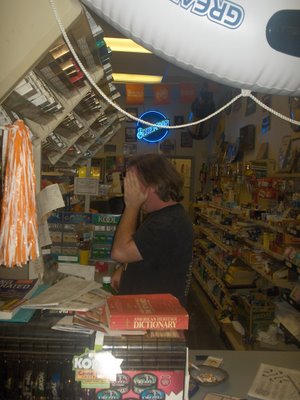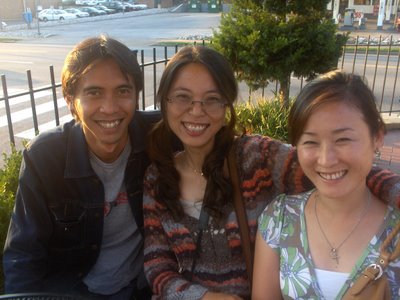
Yesterday I went to the East Tennessee Historical Society to view the documentary, "Living On: Tennesseans Remember the Holocaust." I also viewed the traveling exhibit of black and white portraits of Tennessee survivors and liberators. There are 64 survivors and liberators of the Holocaust living in Tennessee. I was surprised. One man from Franklin, TN, Jimmy Gentry, who helped to liberate Dachau in Germany, vowed to never talk about his experience and what he saw. He thought if he didn’t speak of it, it would go away. He finally began talking and writing about his experience in 1985 after meeting a survivor living in Nashville. Another liberator, Harry Snodgrass, now living in Mt. Juliet, Tennessee, helped liberate Buchenwald and a prisoner came up to him at the fence and asked if he had a cigarette. He had 3 packs of cigarettes on him but there were so many prisoners standing at the fence that he feared it might cause a riot if he got them out. He knew he didn’t have enough for everyone so he just said, "No, I don’t." The man said, "Wait here a minute," and ran off. When he returned he gave Harry Snodgrass a small tin and inside was a dirty cigarette butt and as he gave it to him, he said, "Thank you." You can imagine how this U.S. soldier was humbled by that simple act and why he will never ever forget it. By telling this story, others won’t forget it either. That’s why it is important that we hear these "first person" accounts from survivors, refugees, hidden children, and liberators. Harry Snodgrass also says, "for evil to exist it just takes good people to do nothing."
In the audience of about 100 yesterday was Arthur Pais, a survivor, part of only ten percent of the Lithuanian Jews who lived. I saw his story portrayed in the documentary and I watched his emotional reaction as he watched himself and others. He, his father, and his brother were sent to Dachau in Germany (his mother and sister to Stutthof in Poland). I wanted to say something to him after the film. I’ve talked with two other survivors of the Holocaust in my lifetime. This time, however, I couldn't bring myself to go up to him. I don’t know why. I wanted, however, to tell him how sorry I was for what happened to him, his family, his friends, and his neighbors. So very sorry.
You can read some of these Tennesseans’ stories for yourself:
http://www.wnpt.net/livingon/
 Photos of some nice trees in my neighborhood.
Photos of some nice trees in my neighborhood.
 And, oh yeah, please stop the war.....
And, oh yeah, please stop the war..... The big trees outside my house are beginning their slow strip tease act.....
The big trees outside my house are beginning their slow strip tease act..... ......so you are all welcome to visit with a rake in hand! :) Here's a funny story. Two years ago I had raked all the leaves into a HUGE pile at the edge of my yard, right next to the sidewalk. Apparently, a couple of drunk guys had a little fun jumping around in them late one night. The next day I noticed these guys going through all the leaves with their bare hands. I said, "Uh, are you looking for something?" One said, rather sheepishly, "Yeah, I think I lost my glasses in these leaves last night." I said, "Well, let me get you some gloves because there's all kinds of nasty dog poop raked up in those leaves." The guy just groaned. And he did not find his glasses.
......so you are all welcome to visit with a rake in hand! :) Here's a funny story. Two years ago I had raked all the leaves into a HUGE pile at the edge of my yard, right next to the sidewalk. Apparently, a couple of drunk guys had a little fun jumping around in them late one night. The next day I noticed these guys going through all the leaves with their bare hands. I said, "Uh, are you looking for something?" One said, rather sheepishly, "Yeah, I think I lost my glasses in these leaves last night." I said, "Well, let me get you some gloves because there's all kinds of nasty dog poop raked up in those leaves." The guy just groaned. And he did not find his glasses.































 My friend, Tracy, and her husband, Hua, are expecting their first child. For the last three weeks I have been calling the baby "xiao qi ji" which, in Chinese, means "little miracle." Or so I thought. I was in Tracy’s apt. Sunday evening and a couple of our friends dropped by. One of them is also Chinese. I told her proudly that I refer to the baby as "xiao qi ji." She gave me a confused look and then looked at Hua, who repeated exactly what I said. Or so I thought. She said, in English, "Oh, little miracle." I said, with just a touch of indignation, "Yes, that’s what I said so why didn’t you understand me?" She smiled and said, "Well, qi ji (pronounced "chee jee") also means "penis" (if you say "jee jee" instead of "chee jee" and trust me, they are very similar). My mouth dropped open and I said, "You mean I’ve been calling the baby ‘little penis’ and you didn’t tell me!!!!" Everyone laughed. Apparently, I wasn’t ALWAYS saying it incorrectly and since they knew what I meant, Tracy and Hua were too polite to tell me that sometimes I was calling their little baby a "penis." I swore right then and there never to call the baby "little miracle" (at least not in Chinese) again. It’s all in the way you say it and I just can’t be sure I’ll say it correctly. To give you an example of the complexity of the tones in the Chinese language, the word "shi" (pronounced "sure") means "is," "busy," and the number "ten," depending on the tone you make when you say it. Who knows how many other meanings there are for "shi." Can you just see me living in Beijing and having successfully hailed a cab or ordered exactly what I want to eat in a restaurant, confidently exclaim, "It’s a miracle!" but it comes out all wrong and I’ve just shouted out, "It’s a penis!" No, I don’t think so. It will now be the first word on my list of Chinese words never to use. Perhaps I should learn the word for "vagina".......just in case.
My friend, Tracy, and her husband, Hua, are expecting their first child. For the last three weeks I have been calling the baby "xiao qi ji" which, in Chinese, means "little miracle." Or so I thought. I was in Tracy’s apt. Sunday evening and a couple of our friends dropped by. One of them is also Chinese. I told her proudly that I refer to the baby as "xiao qi ji." She gave me a confused look and then looked at Hua, who repeated exactly what I said. Or so I thought. She said, in English, "Oh, little miracle." I said, with just a touch of indignation, "Yes, that’s what I said so why didn’t you understand me?" She smiled and said, "Well, qi ji (pronounced "chee jee") also means "penis" (if you say "jee jee" instead of "chee jee" and trust me, they are very similar). My mouth dropped open and I said, "You mean I’ve been calling the baby ‘little penis’ and you didn’t tell me!!!!" Everyone laughed. Apparently, I wasn’t ALWAYS saying it incorrectly and since they knew what I meant, Tracy and Hua were too polite to tell me that sometimes I was calling their little baby a "penis." I swore right then and there never to call the baby "little miracle" (at least not in Chinese) again. It’s all in the way you say it and I just can’t be sure I’ll say it correctly. To give you an example of the complexity of the tones in the Chinese language, the word "shi" (pronounced "sure") means "is," "busy," and the number "ten," depending on the tone you make when you say it. Who knows how many other meanings there are for "shi." Can you just see me living in Beijing and having successfully hailed a cab or ordered exactly what I want to eat in a restaurant, confidently exclaim, "It’s a miracle!" but it comes out all wrong and I’ve just shouted out, "It’s a penis!" No, I don’t think so. It will now be the first word on my list of Chinese words never to use. Perhaps I should learn the word for "vagina".......just in case.







 This semester I continue to volunteer as an English Conversation Partner with students attending the English Language Institute of UT. My current students are Renato from Peru and Mega from Indonesia. Mega is from a town in the mountains near West Jaffa and about 2 hours from Jakarta. I’m not sure of Renato’s hometown. Both guys are very personable and their English is quite good. It’s much harder to do well on the TOEFL exam than it is to speak understandable English to Americans. Both Renato and Mega hope to receive TOEFL scores high enough to attend UT. Yesterday evening, Mega and I met at Panera Bread (Renato was studying for a test) and were soon joined by two more ELI students, Ju Ya (like Julia without the "L") from South Korea, and Kayo (pronounced "kai yo" from Tokyo, Japan (far right in photo). We had a great time talking and laughing. I invited the girls to join us again next week for a little "crazy English talking." Mega enjoys it when I feign a heavy southern accent and speak very, very fast. He says he wants to be able to understand people here in East Tennessee and has specifically requested that I speak fast so he can "practice understanding." ha ha Strangely, because of being around foreign friends so much these days, I have begun speaking slower, more distinctly, and without accent. I am now much more likely to say "we will" instead of "we’ll" and instead of "aren’t chu goin’ with us," you’ll hear me carefully pronounce "Are you going with us?" It’s just easier all around because I don’t have to repeat myself and my friends are accustomed to my slowed down speech and they understand me very well. It does sound a little funny, however, when I catch myself speaking this way to long-time American friends! :) Actually, it sounds downright nerdy.
This semester I continue to volunteer as an English Conversation Partner with students attending the English Language Institute of UT. My current students are Renato from Peru and Mega from Indonesia. Mega is from a town in the mountains near West Jaffa and about 2 hours from Jakarta. I’m not sure of Renato’s hometown. Both guys are very personable and their English is quite good. It’s much harder to do well on the TOEFL exam than it is to speak understandable English to Americans. Both Renato and Mega hope to receive TOEFL scores high enough to attend UT. Yesterday evening, Mega and I met at Panera Bread (Renato was studying for a test) and were soon joined by two more ELI students, Ju Ya (like Julia without the "L") from South Korea, and Kayo (pronounced "kai yo" from Tokyo, Japan (far right in photo). We had a great time talking and laughing. I invited the girls to join us again next week for a little "crazy English talking." Mega enjoys it when I feign a heavy southern accent and speak very, very fast. He says he wants to be able to understand people here in East Tennessee and has specifically requested that I speak fast so he can "practice understanding." ha ha Strangely, because of being around foreign friends so much these days, I have begun speaking slower, more distinctly, and without accent. I am now much more likely to say "we will" instead of "we’ll" and instead of "aren’t chu goin’ with us," you’ll hear me carefully pronounce "Are you going with us?" It’s just easier all around because I don’t have to repeat myself and my friends are accustomed to my slowed down speech and they understand me very well. It does sound a little funny, however, when I catch myself speaking this way to long-time American friends! :) Actually, it sounds downright nerdy.


